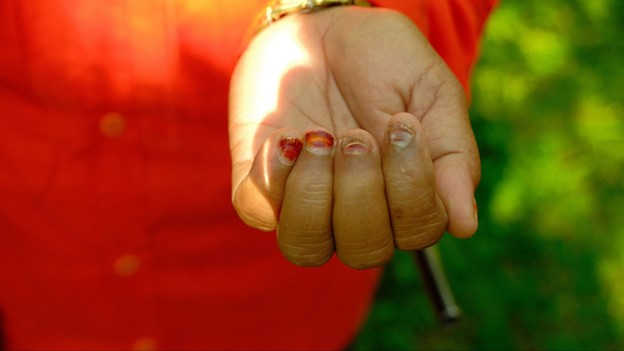Pesticides definitely have a negative effect on women workers on palm oil plantations
Interview Indonesia

Very early in the morning, before the sun rises, Darsinah prepares for her day as a weeder on the Berlian estate, a palm oil plantation in Kotabaru, in Indonesia's South Kalimantan province.
Darsinah has been working as a weeder on the Berlian estate for ten years. At 7am, five women sprayers - all dressed in matching orange shirts, green boots and masks - gather for a morning briefing. The group heads to a small storage place to collect weedkiller, which is poured from large jerrycans into special containers with backstraps and nozzles.
The used ingredients include paraquat and triclopyr, substances associated with health problems. Paraquat, which has been banned in the European Union (EU) since 2007 due to its toxicity, has been linked to Parkinson's disease. Triclopyr is considered moderately hazardous by the World Health Organization (WHO). "When we use a mix of Supretox (paraquat) and Triester (triclopyr), the itching starts immediately," says Poniah, who has been working here for a year.
Provide your own protection
Another worker, Herli Susanti, shows irritated spots on her arm. Hasan, a foreman on the estate, confirms that the herbicides can lead to skin irritation and can even cause the nails of workers to fall off following contact. That is at least what happened to Darsinah, whose nails have been ruined by prolonged exposure to chemicals. Despite these hazards, the plantation does not provide personal protective equipment (PPE). The women have to purchase their own trousers, shirts, masks and boots.
"Ideally, there would be protocols, but we use what we have. As they have not given us anything, we purchase the masks, trousers, shirts and boots ourselves," says Poniah. She previously worked at the Minamas plantation, where workers are given full PPE and can replace worn-out equipment for free. Deborah Simanullang, a worker on the estate, also secretary-general of a trade union federation, says there is discrimination as men do get proper equipment, such as work boots.
Women sprayers at the Berlian plantation in Kotabaru. From left to right: Herli Susanti, Darsinah, Siti Warnia, Poniah and Ori.
Herli Susanti shows discolouration on her hand caused by the agrochemicals she sprays at work.
39 different pesticides
In a study by Public Eye in 2020, export data showed that Indonesia imported more than 2,000 tonnes of paraquat in 2019, most of which originated from Syngenta, an agrochemical company based in Basel, Switzerland, with a factory in the United Kingdom. Last year, research by the International Palm Oil Workers Union (IPOWU) and Profundo identified 39 different chemicals and pesticides used in palm oil plantations in Indonesia. Besides paraquat, other used chemicals include triclopyr and glyphosate. Trade unions who were trained to assist with the counting also participated in the research.
"After the study was conducted, union members at the company protested against the use of a particular pesticide," says Dwi Pratikto, secretary-general of FSPPP-SPSI (Federation of Agricultural and Plantation Workers). Dwi says that the pesticide, which is mainly used to kill insects, is so toxic that simply inhaling it can almost cause workers to collapse. "First, two people suffered from it. We helped them go to the clinic. When another case occurred, we demanded that the substance be banned." The unions threatened management with making the case public. Eventually the company stopped using the substance and the affected employees received letters transferring them to positions that did not involve spraying.
Darsinah says two of her fingernails had to be removed after prolonged contact with agrochemicals.
Most of the women sprayers do not have permanent positions. Darsinah, the oldest among them, only received a permanent appointment two years ago. The rest work on a fixed system of two days of wages, and four other days paid on the basis of output. Each sprayer is expected to spray five hectares a day. Although rules dictate that they can work a maximum of five hours because of chemical exposure, overseers sometimes pressure them to work longer.
Itchy skin
Things are slightly different at the Minamas plantation. Workers, including sprayers and fertiliser spreaders, have personal protective equipment (PPE). All chemicals are kept in a storage place and one person takes care of storing all PPE. Sprayers must shower before starting work and immediately after work.
The women at the Berlian estate would like the company to hire them as permanent employees, as it did for Darsinah. "We came here from Java and Flores looking for work, but we only work two days and the other four days we scratch our itchy skin," says Poniah.
Text and photos: Steven Handoko




